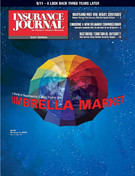On June 28, 2004, Pennsylvania Gov. Ed Rendell signed Senate Bill 815 into law. Now known as “Act 46,” the law amends the Pennsylvania’s Insurance Department Act to address the treatment of commercial lines large deductible policies in insurance company liquidations.
On the same day, the Illinois Legislature sent a similar bill, enrolled House Bill 5928, to Gov. Rod Blagojevich for signature. Both bills contain important reforms that help resolve serious conflicts between policyholders, receivers and guaranty funds, and they serve as helpful models for other states to consider.
The Pennsylvania and Illinois reform measures were each based on model legislation proposed by the National Conference of Insurance Guaranty Funds (NCIGF). The NCIGF organized a task force in November 2002 to identify and analyze problems and issues raised by recent large insolvencies, and to develop potential solutions.
One example of the issues created by large-deductible policies arose during two recent Pennsylvania liquidations, Reliance Insurance Co. and Legion Insurance Co. In those estates, the state property/casualty guaranty funds and the Pennsylvania liquidator each disputed who owned the large-deductible reimbursements and collateral under programs written by those insurers.
Overview of large-deductible programs
Typically, large-deductible insurance covers workers’ compensation, commercial auto and general liability exposures of a medium to large commercial insured. The deductibles often vary from $100,000 to $1 million or more per claim, with the insured being responsible for loss within the deductible. Although the insurance policies obligate the insurer to pay all claims within the deductible, side agreements and endorsements define the large-deductible arrangements creating the insured’s obligation to reimburse the deductible.
Under insurer-funded arrangements, the insurer pays claims within the deductible and then bills the insured for the reimbursement. Under arrangements funded by the insured, the insurer agrees to allow the policyholder to fund its own claims within the deductible and the policyholder typically provides funds directly to a third party administrator.
In order to secure the insured’s liability under the large-deductible arrangements, insurers usually require the insured to post collateral. In some of the large-deductible programs written by Legion, the policyholder was required to purchase a deductible reimbursement policy from an offshore affiliate, which was secured by collateral in an offshore trust account.
Because the policies in the large-deductible arrangements are written with the insurer responsible for first-dollar coverage, when the insurer becomes insolvent, the guaranty funds may be responsible under their respective state laws to handle and pay covered claims falling within the deductibles. This is especially prevalent under state workers’ compensation statutes.
In the Pennsylvania insolvencies, the guaranty funds argued that they were entitled to be reimbursed by the policyholder for any amounts they paid on a claim within the deductible; otherwise they would be taking on more risk than the insolvent insurer had while it was solvent. The receiver argued that the deductible reimbursements and collateral securing the deductible liability were assets of the estate to be used for the benefit of all policyholder claimants.
The policyholders in insured-funded programs wanted to continue to handle their own claims, while the policyholders in insurer-funded programs were concerned that they might have to pay twice—some had originally posted large amounts of collateral and were now being requested to pay again.
Key provisions of the recent legislation
In insurer-funded arrangements, to the extent the guaranty funds pay claims within a program’s deductible, the receiver shall promptly bill the policyholder for the reimbursement. When the policyholder reimbursements are collected, the receiver shall promptly reimburse the guaranty funds for claims paid within the deductibles, minus the receiver’s reasonable actual expenses.
Any collateral put up by the policyholder to secure its obligations under a deductible agreement or to secure its obligations under a deductible reimbursement policy is not considered an asset of the estate and is to be used by the receiver to fund or reimburse claims payments by the guaranty funds within the deductible.
Each bill applies to the delinquency proceedings that are open and pending as of the effective date of the bill. The Pennsylvania legislation applies to the Reliance, Legion and PHICO insurance company insolvencies.
Suzanne Sahakian is a partner in the law firm of Dykema Gossett PLLC. She specializes in insurance company insolvencies and guaranty fund law and is the head of her firm’s insurance practice group. She can be reached at ssahakian@dykema.com. Kurt Gallinger is also a partner at Dykema Gossett. He specializes in financial services regulation and is a member of the firm’s government policy practice group. He can be reached at kgallinger@dykema.com.
Was this article valuable?
Here are more articles you may enjoy.


 US Appeals Court Rejects Challenge to Trump’s Efforts to Ban DEI
US Appeals Court Rejects Challenge to Trump’s Efforts to Ban DEI  Chubb CEO Greenberg on Personal Insurance Affordability and Data Centers
Chubb CEO Greenberg on Personal Insurance Affordability and Data Centers  Pipeline Explodes at Delfin LNG Planned Project in Louisiana
Pipeline Explodes at Delfin LNG Planned Project in Louisiana  Zurich Insurance’s Beazley Bid Sets the Stage for More Insurance Deals
Zurich Insurance’s Beazley Bid Sets the Stage for More Insurance Deals 


